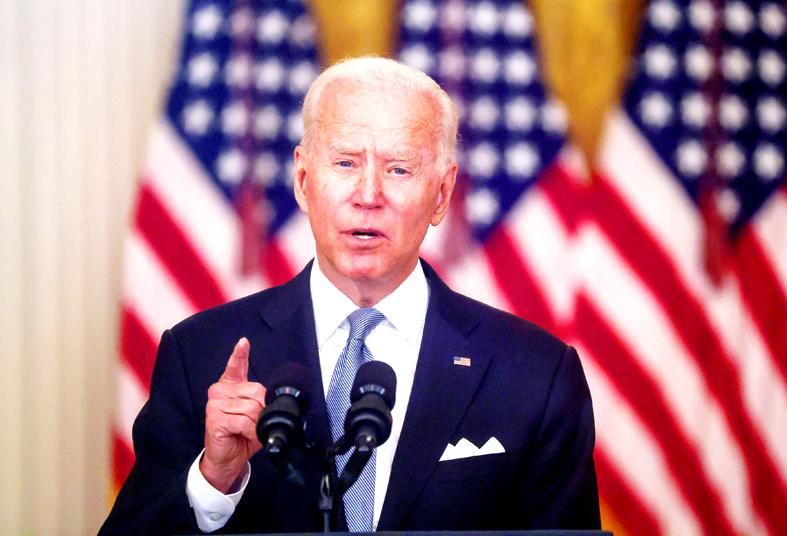US policy on Taiwan has not changed, a Washington official said after US President Joe Biden appeared to suggest that the US would defend Taiwan if it were attacked, a deviation from a long-held US position of “strategic ambiguity.”
In an interview aired by ABC News on Thursday, Biden was asked about the effects of the chaotic US withdrawal from Afghanistan and responses in Chinese media telling Taiwan this showed Washington could not be relied on to come to its defense.
Biden replied that Taiwan, South Korea and NATO were fundamentally different situations to Afghanistan and appeared to lump Taiwan together with countries to which Washington has explicit defense commitments.

Photo: Reuters
“They are ... entities we’ve made agreements with based on not a civil war they’re having on that island or in South Korea, but on an agreement where they have a unity government that, in fact, is trying to keep bad guys from doing bad things to them,” he said.
“We have made — kept every commitment. We made a sacred commitment to Article 5 that if in fact anyone were to invade or take action against our NATO allies, we would respond. Same with Japan, same with South Korea, same with — Taiwan. It’s not even comparable to talk about that,” he added.
A senior Biden administration official said that the US “policy with regard to Taiwan has not changed” and analysts said it appeared that Biden had misspoken.
In Taipei, Presidential Office spokesman Xavier Chang (張惇涵) said they had “noted” Biden’s comments, and thanked his administration for “continuing to take practical actions” to show its “rock-solid” commitment to Taiwan in areas such as arms sales.
President Tsai Ing-wen (蔡英文) has emphasized that Taiwan’s “only choice” is to demonstrate its resolve in matters of self-defense, Chang added.
China’s embassy in Washington did not immediately respond to requests for comment.
While Washington is required by law to provide Taiwan with the means to defend itself, it has long followed a policy of “strategic ambiguity” on whether it would intervene militarily to protect Taiwan in the event of a Chinese attack.
Article 5 is a NATO agreement that states that an attack on one member of the alliance is viewed as an attack on all.
South Korea is also a US treaty ally with a mutual defense agreement, but US relations with Taiwan have been unofficial since Washington switched diplomatic recognition to Beijing in 1979.
Some prominent US academics and others have said that Washington should give Taiwan a more explicit security guarantee in light of increasing military pressure from Beijing, but US National Security Council Coordinator for the Indo-Pacific Kurt Campbell has appeared to reject this, saying in May that there were “significant downsides” to such an approach.
US National Security Adviser Jake Sullivan was asked about Taiwan this week and called it a “fundamentally different question in a different context” to Afghanistan.
“We believe our commitment to Taiwan ... remains as strong as it’s ever been,” he said, without specifying what the commitment was.
Additional reporting by CNA

Right-wing political scientist Laura Fernandez on Sunday won Costa Rica’s presidential election by a landslide, after promising to crack down on rising violence linked to the cocaine trade. Fernandez’s nearest rival, economist Alvaro Ramos, conceded defeat as results showed the ruling party far exceeding the threshold of 40 percent needed to avoid a runoff. With 94 percent of polling stations counted, the political heir of outgoing Costa Rican President Rodrigo Chaves had captured 48.3 percent of the vote compared with Ramos’ 33.4 percent, the Supreme Electoral Tribunal said. As soon as the first results were announced, members of Fernandez’s Sovereign People’s Party

EMERGING FIELDS: The Chinese president said that the two countries would explore cooperation in green technology, the digital economy and artificial intelligence Chinese President Xi Jinping (習近平) yesterday called for an “equal and orderly multipolar world” in the face of “unilateral bullying,” in an apparent jab at the US. Xi was speaking during talks in Beijing with Uruguayan President Yamandu Orsi, the first South American leader to visit China since US special forces captured then-Venezuelan president Nicolas Maduro last month — an operation that Beijing condemned as a violation of sovereignty. Orsi follows a slew of leaders to have visited China seeking to boost ties with the world’s second-largest economy to hedge against US President Donald Trump’s increasingly unpredictable administration. “The international situation is fraught

MORE RESPONSIBILITY: Draftees would be expected to fight alongside professional soldiers, likely requiring the transformation of some training brigades into combat units The armed forces are to start incorporating new conscripts into combined arms brigades this year to enhance combat readiness, the Executive Yuan’s latest policy report said. The new policy would affect Taiwanese men entering the military for their compulsory service, which was extended to one year under reforms by then-president Tsai Ing-wen (蔡英文) in 2022. The conscripts would be trained to operate machine guns, uncrewed aerial vehicles, anti-tank guided missile launchers and Stinger air defense systems, the report said, adding that the basic training would be lengthened to eight weeks. After basic training, conscripts would be sorted into infantry battalions that would take

GROWING AMBITIONS: The scale and tempo of the operations show that the Strait has become the core theater for China to expand its security interests, the report said Chinese military aircraft incursions around Taiwan have surged nearly 15-fold over the past five years, according to a report released yesterday by the Democratic Progressive Party’s (DPP) Department of China Affairs. Sorties in the Taiwan Strait were previously irregular, totaling 380 in 2020, but have since evolved into routine operations, the report showed. “This demonstrates that the Taiwan Strait has become both the starting point and testing ground for Beijing’s expansionist ambitions,” it said. Driven by military expansionism, China is systematically pursuing actions aimed at altering the regional “status quo,” the department said, adding that Taiwan represents the most critical link in China’s